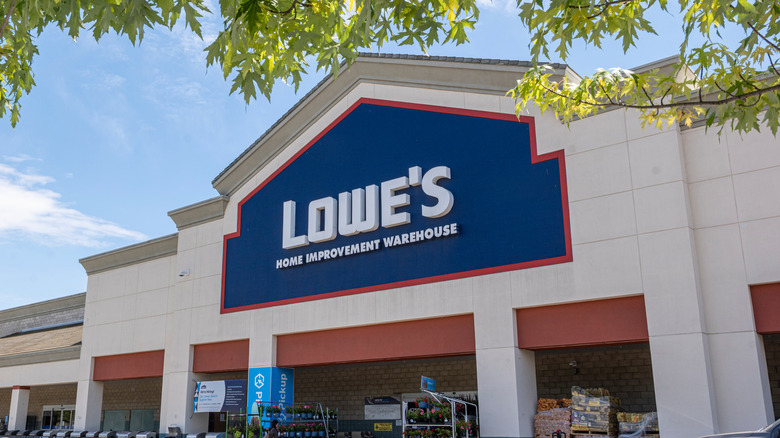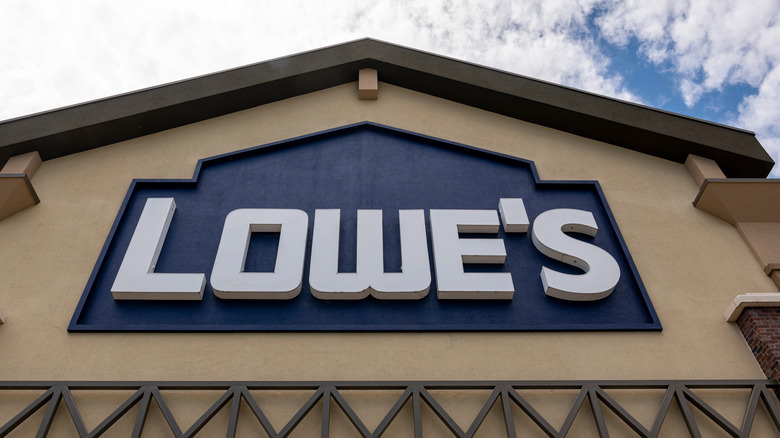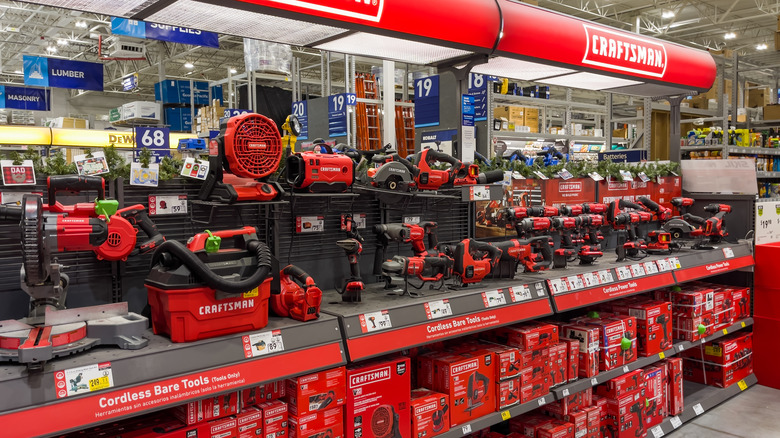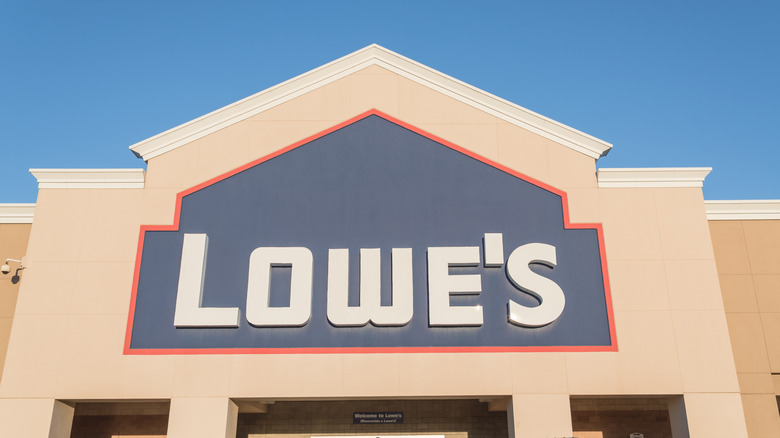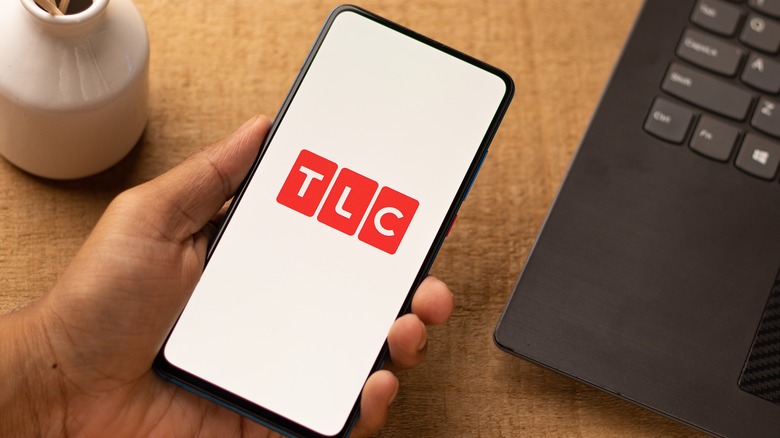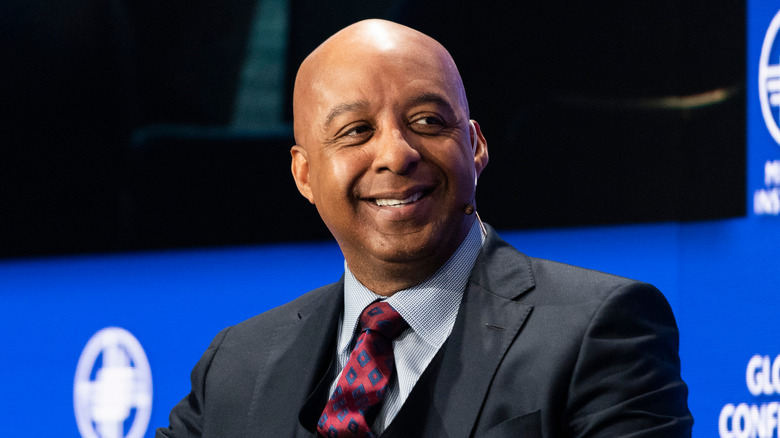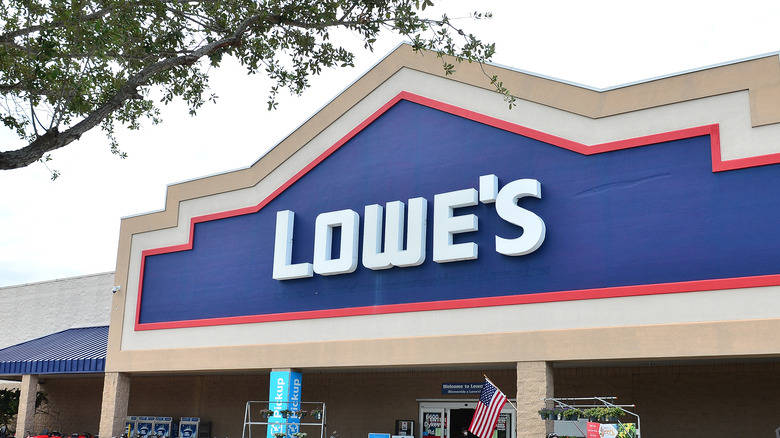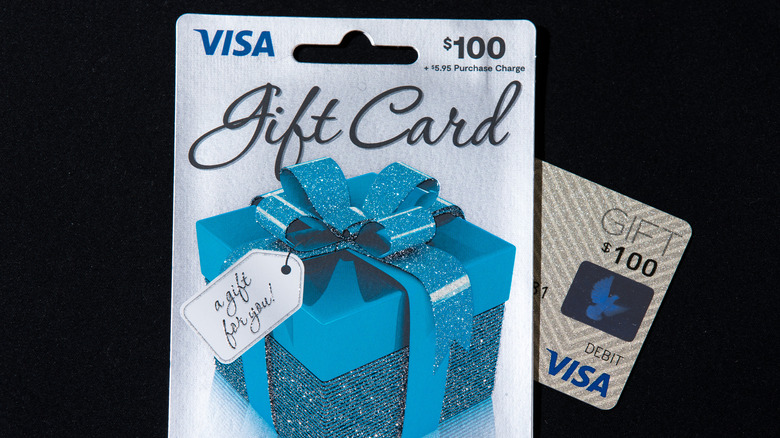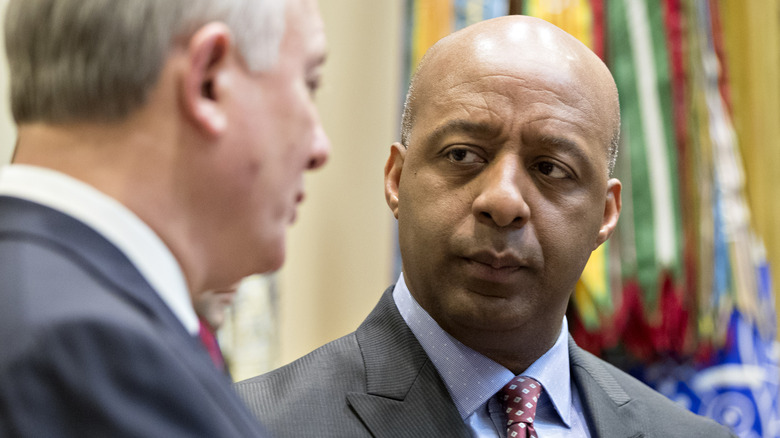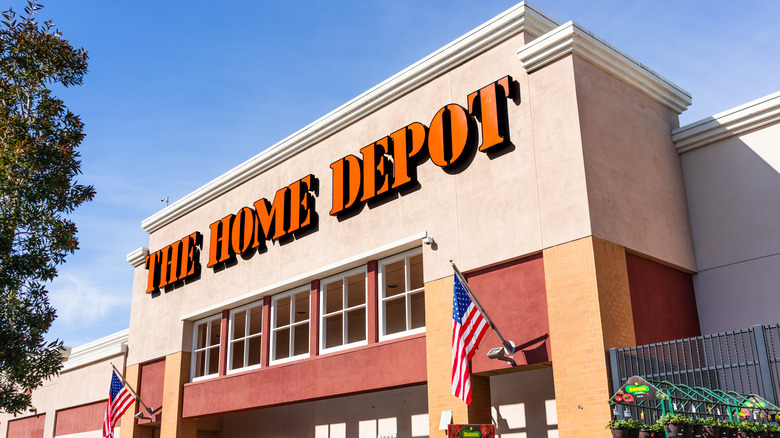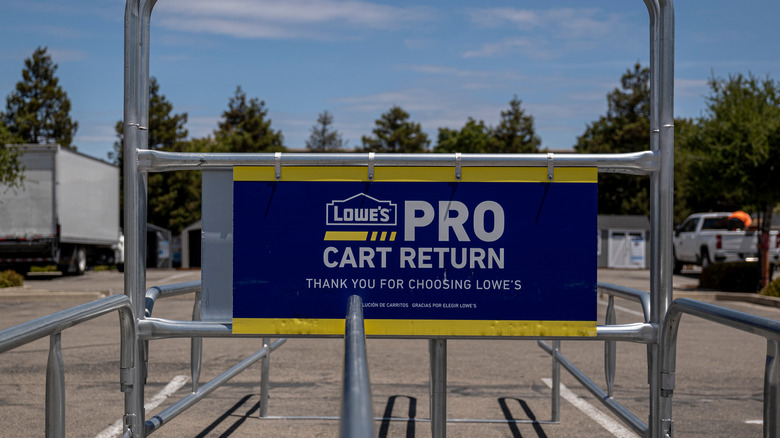The Untold Truth Of Lowe's
According to Inc., the DIY movement isn't just a fleeting hobby for most people. In fact, it's actually a multi-billion dollar industry that's growth will be off the charts for years to come. Certain industries really benefit from the DIY boom, particularly home improvement chains like Lowe's. The company offers many hacks that will change how you DIY. Due to the ongoing effects of the COVID-19 pandemic, Lowe's has seen record profits in recent years (via CNBC).
As more people spent more time than ever before at home during the pandemic, they began slowly working their way through the projects around the house that they'd always meant to get around to doing. In addition, as the workforce changes to accommodate more digital and remote work, people need to create home offices — sparking a need for even more home improvement supplies. However, adapting its business plan to suit the needs of the current market is nothing new for Lowe's. The store has been in operation since 1921 and holds many untold truths. Keep reading for some of the biggest secrets Lowe's employees won't tell you and stories from the company's history.
Lowe's started as North Wilkesboro Hardware
L.S. Lowe founded the first store in 1921 as Lowe's North Wilkesboro Hardware. According to Our State, the old-timey hardware store was on C Street in downtown North Wilkesboro, North Carolina. The building was about 3,500 square feet and provided most things that a general store would carry: groceries, barbed wire, miscellaneous hardware, and even tobacco products.
Lowe passed away in 1940 and left his store for his daughter, Ruth Lowe. She sold the business to her brother, Jim Lowe, but he left soon after to fight in World War II. Ruth and her mother, Floy Elizabeth Lowe, stayed behind to run the business the best they could while Jim was away. Times were tough during the war, and although the women did their best to source suppliers and balance books, the store nearly failed multiple times. No one knew when Jim would be back from the war, and the company's future was uncertain.
Carl Buchan joined the company after a gentleman's agreement
Things took a turn when H. Carl Buchan Jr. hurt his foot in Europe in the army. According to Our State, he was given an honorable discharge in 1943 and sent home to North Carolina. After meeting Ruth Lowe, the pair got married. As a married man, he needed a job, and his wife was looking after her brother's struggling hardware store. So, the pair reached out to Jim, who was still fighting in Europe, and asked if they could bring Carl on board.
Jim was all for the idea, but he did have one little stipulation: Carl needed to take a complete inventory of every product in the store. Once he had the list, he had to pay Jim in cash for each item. If he did that, he could be a co-owner in the store 50/50 with Jim. Carl accepted the offer right away and got to work. His leadership and business acumen eventually brought the store back from the brink.
The store shifted to home improvement after World War II
Before the end of the Second World War in 1945, Lowe's had a larger product selection than it does now. According to Lowe's, when Lowe's was still known as North Wilkesboro Hardware, they sold hardware and building materials, sewing supplies, dry goods, horse tack, produce, and other groceries. This business model barely carried the company through the war, and once it ended, things needed to change.
The co-owner of Lowe's, Carl Buchan, thought there would be a massive construction boom since many soldiers came home to buy homes and start families. Buchan was right, as many federal policies created in the 1950s helped returning soldiers and other people coming of age in the era purchase homes (via Curbed). Homeownership meant a need for home improvement supplies, so Buchan changed the business plan, and Lowe's as we know it today started to take off.
Founder H. Carl Buchan died of a heart attack in 1960
Unfortunately, H. Carl Buchan wasn't around very long to enjoy much of his company's success. According to Wilkes Journal-Patriot, he was just 44 years old when he passed away due to a massive heart attack. He was a driven businessman who died too young. Buchan was born in 1916 in Pinehurst, North Carolina. He was always a forward-thinking businessman and pushed back against standard business practices during his time with Lowe's in the 1950s.
For example, he detested purchasing items from wholesalers and instead wanted to supply his stores by purchasing items straight from the manufacturers instead. He invented the phrase "direct to user," sometimes abbreviated as DTU, to bring down prices by buying direct. Federal laws were preventing a lot of DTU from purchasing on behalf of corporations, but they were eventually repealed. However, Buchan, unfortunately, did not live to see the new way of business come to fruition.
Lowe's had a pilot on staff that flew over Buchan's home
When Buchman failed to turn up for a meeting the morning of his death, his colleagues knew something was wrong because he was typically a prompt man. According to Business North Carolina, Carl Buchan's team met at the main office to talk about the business goals of the upcoming week every single Saturday morning at nine o'clock sharp. The team felt uneasy because Buchan was usually early and had never kept them waiting before.
They waited about 30 minutes before calling his farm to check on him. When no one answered, their worry only grew. At that time, Lowe's had a pilot on staff named Max Freeman, who flew a single-engine Cessna 182. Senior management called Freeman and asked him to do a welfare check on Buchan since he could go there the fastest with his plane. Freeman flew low over the house to make as much noise as possible, but no one came out to see what was causing the racket. When he reported back to senior management, they asked him to land and check again. Unfortunately, Max Freeman discovered Buchan, who had seemingly passed away the night before while preparing to sleep.
Lowe's went public in 1961 and was listed on the NYSE in 1979
Lowe's has pursued a profit-sharing model for nearly the entirety of its history. According to Lowe's, the store officially went public to those wanting a piece of the pie on October 10, 1961. On the first day of trading, potential investors purchased over 400,000 shares in the company at $12.25 per share. This initial opening signaled great public interest in the company, but Lowe's didn't make it to the New York Stock Exchange until December 19, 1979 — eighteen years later.
Lowe's NYSE debut was remarkable because the store's greatest rival in the home improvement space, The Home Depot, was founded just one year before, on June 29, 1978. The Home Depot was accepted on the NYSE much quicker than Lowe's, as it began trading on April 19, 1984, just six years after its start (via The Home Depot).
Lowe's once pulled ads from airing during All American Muslim
According to NPR, Lowe's once pulled its ads from airing during the TLC series "All American Muslim." This decision caused controversy. The reality show aired on TLC in 2011 and was an eight-part documentary series that followed five Muslim families living in Dearborn, Michigan — a suburb on the south side of Detroit.
When the show aired, groups like Florida Family Association pushed advertisers to pull their commercials from airing alongside the program. Lowe's was one of the companies that agreed when they stated to the public, "Lowe's has received a significant amount of communication on this program, from every perspective possible. Individuals and groups have strong political and societal views on this topic, and this program became a lightning rod for many of those views. As a result, we did pull our advertising on this program" (via CNN). When Lowe's announced this decision, the home improvement retailer faced backlash from groups like the Council on American-Islamic Relations (CAIR) and various members of congress.
Lowe's CEO Marvin Ellison worked his way up from minimum wage
According to The Dallas Morning News, Lowe's CEO Marvin Ellison started his career in retail as a minimum wage worker. He grew up near Memphis, Tennessee in a working-class family before attending the University of Memphis to earn a degree in business. He took five years to graduate instead of the typical four because he worked multiple jobs to put himself through school.
He worked overnight at a convenience store and was also a janitor at a women's department store during the school year, and drove a plumbing supplies truck without air conditioning during summer vacation. Once Ellison graduated, he began working his way up the retail ladder after landing a job at a local Target. He worked at The Home Depot in a corporate capacity before moving to J.C. Penny and Lowe's. Many think his working-class background and experience working the floor in retail as a student make him perfect for the top job, as his life skills back up his business sense.
Lowe's has an operations base in Bangalore, India
According to Lowe's, the company began expanding into the Indian market in 2015. The first step was to establish an office in Bangalore, India. Since then, the company has poured significant funding into this new venture. As Mohith Mohan, head of HR for Lowe's India, told The Economic Times, "Lowe's in India is an integral part of what we do for our parent organization. In the U.S. we've grown rapidly through the pandemic, since we're in the home improvement business and our customers have been investing more in their homes through this time."
The company has set up India as its technology center, relying on Indian employees for online customer service and website and infrastructure support. Since this has gone so well, Lowe's management is also expanding other parts of their business needs to the country, like supply chain management, human resources, and even its finance department.
Lowe's has four main inventory suppliers
According to Investopedia, the purchasers of Lowe's buy from four suppliers more than any other company. The four primary suppliers to Lowe's are Avery Dennison Corporation (AVY), Illinois Tool Works Incorporated (ITW), Stanley Black & Decker Corporation (SWK), and Deere & Company (DE). You might recognize Deere & Company because it's the famous green and yellow tractor company John Deere that inspired "Big Green Tractor" by Jason Aldean.
In addition to repping products from these four brands, Lowe's also has several in-house store brands for customers. They include allen + roth, Project Source, and Harbor Breeze. As is the case for most store brands, Lowe's can cut out the middleman when selling their own brands, so purchasing a store brand item is typically less expensive than the same item from one of the four suppliers. This trick helps save money when shopping at Lowe's.
Lowe's has been the target of a gift card phishing scheme
According to WFLA- TV, there is an unfortunate growing trend of predators using Lowe's gift cards to steal from unsuspecting community members. The scheme often pairs with a ransomware hack. You click a bad link, and the hacker gets control of your computer or your account. Someone then calls you up to ask if you want to get things back, then you need to do what they say. In most cases, this means purchasing gift cards from big box stores, which are hard to trace.
Scammers favor Lowe's as their gift card location because the store doesn't limit the number of gift cards you can purchase in one session nor the amount of money you can put on the cards. In one case, a veteran lost $5,000 over three gift cards. Scams like these are so common that Lowe's has added an entire section to its website advising consumers on how to avoid falling into the traps. The best advice is never to open a suspicious email and never click a suspicious link (via Lowe's).
CEO Marvin Ellison thinks Millennials might save the home improvement industry
The CEO had plenty of nice things to say about an often talked down upon generation. While many publications report that Millennials are killing industries, according to Insider, Lowe's CEO Marvin Ellison told the crowd at the National Retail Federation's 2019's "Big Show" that he thinks Millennials are the generation that will save the home improvement industry.
"They're now, in some cases, buying older homes because they desire to live closer to the city," he said to those in attendance. "They're going into those homes and they're making investments to make those homes modern, to their taste. [It's] incumbent [upon Lowe's to] really understand those customers and those customer segments." Ellison's business plan caters to the wants and needs of younger homeowners who are in the process of transforming the house they bought into the home of their dreams. This business plan echos Lowe's shift to home improvement after World War II.
Lowe's is often put forward as an alternative to Home Depot
According to The Washington Post, Lowe's main rival in the home improvement space is Home Depot. The store, famous for its bright orange branding and catchy commercial tunes, has found itself at the center of controversies due to corporate donations to political candidates. Many shoppers, frustrated that their dollars were funding political campaigns that do not align with their personal convictions, vowed to boycott The Home Depot in favor of shopping for home improvement goods exclusively at Lowe's. On the other hand, the same donations have caused many to prefer to shop at The Home Depot.
Lowe's CEO Marvin Ellison has been in the position since 2018, before which he worked at both Target and The Home Depot in corporate settings. While Target and The Home Depot often make bold political statements with their advertisements and donations, Lowe's has stayed out of the spotlight in these areas.
Lowe's has a loyalty program for contractors
If you work as a contractor and spend a lot of money at the home improvement store, you might be eligible for a Lowe's discount. According to Lowe's, the program unlocks rewards for loyal customers based on how much they spend each year. There are four levels of membership: MVP, Silver MVP, Gold MVP, and Platinum MVP. Each category comes with its own minimum spend.
Across each level, MVP members receive access to win all-pro prizes, which are tools and other items to help your business. Spend $2,500 or more at Lowe's in one year, and you begin earning other rewards like free drinks and snacks each month and a 1.5 percent cash back through Lowe's online gift cards based on total spending. In addition, you can rent tools from Lowe's, access to in-store pro support, and better delivery options if you need things taken directly to your worksite.
